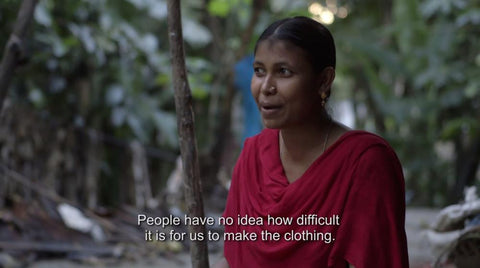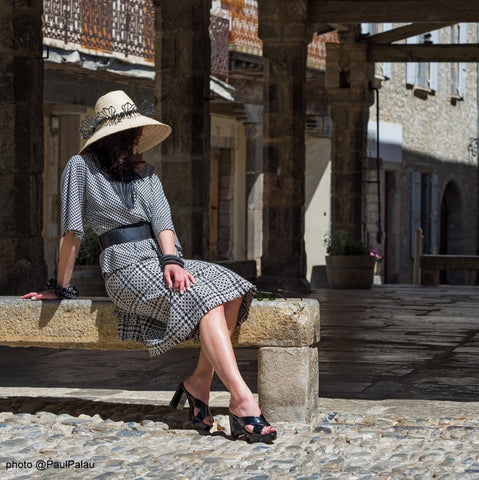
I know I’ve been in the fashion industry most of my life but last night I watched the award winning film/documentary “The True Cost” of fashion and it appalled me! While I recognise the fashion industry has evolved from 2-seasons-a-year to 52 seasons now – yes a new season each week – I wasn’t really aware of just what that exploitation involved. For some time now, I have followed the Fashion Revolution campaign #whomadeyourclothes with interest. Also, I permanently interrogate myself on my own part in this enormous machine that is consumerism. But The True Cost has had a real impact on me. It is a film about the clothes we wear, the people who make them, and the impact the industry is having on our world. It’s about corporate greed versus environmental and human well-being. The reality of the production of fast fashion is truly shocking and it can no longer be acceptable to pretend ignorance.
Each need is as essential as the other
I wrote a blog some time ago about a friend who had complained that a dress she had seen had cost €200 – and in her eyes wasn’t even beautiful. She is used to paying €20. While I understand that we all have financial choices to make, she also needs to look at the overall picture. How many 20euro dresses does she buy and how often? How many times does she wear them? If she took 2 minutes to think it through, and just considered her own personal hourly wage, she would see that there’s clearly something very wrong with a dress, ugly or beautiful, only costing €20. We pay other people for their services because we don’t know how to or don’t want to do it ourselves. If you can’t sew, you pay someone else to make your clothes. If you can’t build a house you employ a builder. If you don’t know the law, you pay a lawyer to help you. And so on. Each need is as essential as the other. Is it OK to pay the person that made your Zara/H&M dress $3/day? Is it ok that some owners of these sweat shops cut corners and jeopardise the safety of their staff such as in the horrific accidents in Bangladesh where more than 1200 workers were killed in one year? The argument that at least they have a job and it could be much worse does not vindicate this $3 salary – in my opinion.
The hidden misery
When I started my business here in France, in 1992, nearly all of the fabrics I bought were French. Now virtually none are. Why? Because they’re cheaper from the East. So all those jobs in French fabric production are now gone. France used to have a thriving garment industry. Nearly all of those jobs have disappeared too because the corporate clothing companies go where the cheapest labour can be found. France and Italy have a thriving underground sweatshop industry alive and kicking, under the radar. Made in France and Made in Italy labels are no indication of honourable provenance. I would love to source more fabrics locally. If you know of someone who is similarly minded, please let me know as I would consider collaborating with them.
Take a stance
The irony of my personal income generation being derived from consumerism is not lost on me, believe me. But I am very clear on my moral stance and my business model is designed around those morals. My fabrics are upcycled stock; that means I do not order fabric to be especially made for me. Instead I buy up ends of lines from over production by other clothing producers. These beautiful fabrics would otherwise have ended up in landfill which is one of the worse bi-products of this consumerism. For example, in Haiti, the influx of charity donated clothes that charity shops can’t sell, means that its own garment industry is now suffering. I continue to choose quality, beautiful fabrics. I then personally create, cut and assemble my own clothing designs to a standard that I believe gives very good value for money. My styles are classic contemporaries that are timeless, in fabrics that will last washing or cleaning for years and years. And I know this because I have such positive feedback from my clients. The concept is to keep them for many years and enjoy mixing them with other old and new items. It’s not about them lasting one season and then throwing them away. My jewellery and homeware collections are sourced from fairly traded suppliers in Southern Africa. The ranges are produced by hand, by skilled crafters. I refuse to resell a product where I am not completely sure of its provenance, circumstances of production or that is in competition with one of my other artisan colleagues in Lagrasse.
So I would like to start a “B Smart" campaign where you can return any of my designs that you no longer wear and they’ll be passed onto others, in need, that would. You can contact me here if you would like to participate.

This beautiful fabric was destined for landfill. There was absolutely nothing wrong with it except the fashion house didn’t need it. Upcycling - part of my "B Smart" campaign.
Also, I would love you to check out these links to learn more about the reality of our fast-fashion obsession. And please let me know what you think. We can all do one tiny thing to help stop the exploitation not only of our fellow human beings but of our poor planet. We, the consumer, are still very powerful.
- The True Cost – the film https://truecostmovie.com/about/ and also on Netflix
- Fashion Revolution https://www.fashionrevolution.org/


6 comments
Bravo Beverly. I am proud of you. Have circulated this to my fashion conscious friends.
And what it comes down to is that the consumer wants everything to be cheap – cheap clothes, cheap food, cheap travel etc etc and industry responds in kind. This is what has led to sweat shops reminiscent of the Victorian era, intensively farmed (and frankly not very nice tasting) meat which contributes hugely to global warming, rainforests being cut down to provide land for palm oil plants because palm oil melts at a much higher temperature than sunflower/olive/rapeseed oils etcetc. And whilst I appreciate that Tim and I fly a lot, flights should not be a tenner! (Not that I’ve paid a tenner for a flight ever).
It needs global leadership. And in the meantime we can all do our bit : don’t shop in Primark, don’t eat at MacDo, don’t buy food products made with palm oil, pay the right price for a locally-sourced, ethical product. Support local businesses!
Very big sigh…
Article très intéressant et bien écrit comme les autres ! Un “plaisir” à lire!
Malgré le fait qu’on sait déjà beaucoup sur la fabrication de vêtements dans le monde c’est toujours bien de se rendre compte à nouveau et changer petit à petit nos habitudes. Merci pour ces pensées.
Hi Bev
This is right on and yes I am happy to be part of the campaign.
I have always felt conflicted about going to places like H and M or Primark and I very rarely do. it is much more fun to mix and match clothes we have had some time with newer things.
My main boast is that I have a beautiful black and white pin striped suit which I bought in Tenby Wales when I was on holiday with my parents – back in 1985!! It still fits me and i still wear it and feel good in it.
So your campaign is really worthwhile
Good Luck and congratulations
Kate x
je suis tout à fait d’ accord avec votre analyse sur les effets de la mondialisation dans la mode. je suis d’ accord pour participer à la compagne de don des vêtements que vous proposez. Amicalement,